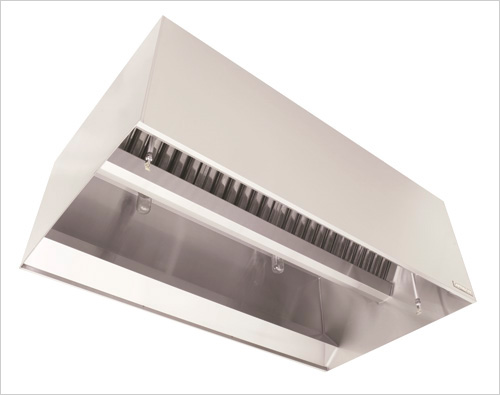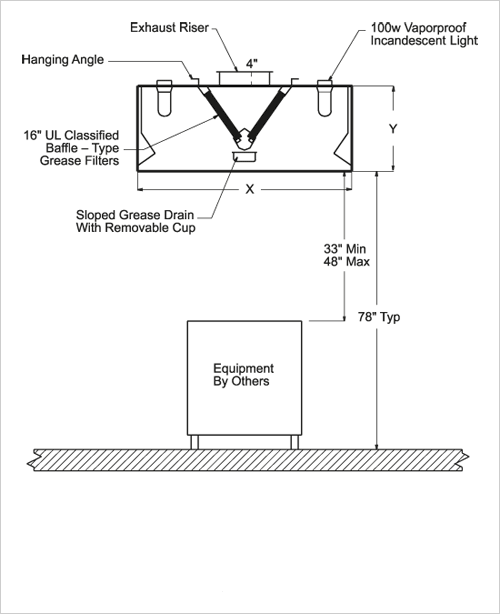
EconAir’s EXI exhaust only hood efficiently meets
the challenges of any island style cooking application.
Features at a Glance
• ETL Listed and ETL Sanitation Listed Product
• Superior Exhaust Flow Rates
• Exceptional Capture and Containment of Cooking Vapors
• Island Configuration
• Front Design Directs Air into Filters
• Stainless Steel Construction
• Double Wall, Insulated Front
• Heavy Duty Stainless Steel Grease Baffle Filters
• Grease Drain System
• Pre-punched Hanging Angles
• Factory Pre-wired Lighting
Optional Equipment
• Utility Cabinet
• Fire Suppression System
• Electrical Controls
• Front Perforated Supply Plenum
• UL Listed Exhaust Fire Damper
• Enclosure Panels to Ceiling
• End Panels
• Type 304 Stainless Steel Construction
– Exposed Surfaces Only
– 100% Construction
• High Velocity Cartridge Filters
• High Efficiency Filters
• Captrate Combo, - Solo Filters
• Stainless Steel Baffle Type Filters
• Lighting
– Recessed Incandescent
– Recessed Fluorescent
– Compact Fluorescent
– LED
– Recessed LED
– Halogen
• Roof Top Package
• Separate Exhaust and/or Make-Up Air Fans
• Heated Make-Up Air Units
– Direct Gas Fired Heated Make-Up Air Fans
– Indirect Gas Fired Heated Make-Up Air Units
– Electric Heated Make-Up Air Units
• Face Mounted Controls
Performance Data
| Avg Cooking Surface Temp (°F) - Cooking Surface |
Min Exhaust CFM/ft | Recommended Duct Sizing |
|
400°F Ovens, Steamers, Kettles, Open-Burner Ranges, Griddles, Fryers |
346 |
Exhaust Based on 1500 FPM |
|
600°F Gas Charbroilers, Electric Charbroilers |
422 | |
|
700°F Mesquite Grills, Charcoal Charbroilers, Gas Conveyor Charbroilers |
475 |
EXI Specifications
Description The model EXI is a Type I, single-island, exhaust canopy used for collection and removal of grease-laden vapors and smoke over all types of restaurant equipment.
Application The hood shall provide flexibility in designing kitchen ventilation equipment and shall be tested and listed for use over 400°F light/medium duty cooking surfaces; 600ºF heavy duty cooking surfaces; and up to 700°F extra heavy duty cooking surfaces.
Construction The hood shall be constructed of type 430 stainless steel with #3 or #4 polish where exposed. All seams shall be welded or in conformance with UL 710 standards. Unexposed surfaces shall be constructed of aluminized steel. Individual component construction shall be determined by manufacturer and ETL. Construction shall be dependent on the structural application to minimize distortion and other defects. All seams, joints and penetrations of the hood where grease-laden vapors and exhaust gases are present must be liquid-tight, continuous welds in accordance with NFPA 96.
The hood shall be constructed to include:
• A double wall insulated front to eliminate condensation and increase rigidity. The insulation shall have a flexural modulus of 475 EI, meet UL 181 requirements and be in accordance with NFPA 90A and 90B.
• An integral front baffle to direct grease laden vapors toward the exhaust filter bank.
• An integral grease drain system on the hood back with a minimum 1/8” per foot slope, to include an exposed, removable 1/2 pint grease cup to facilitate cleaning.
• A built-in wiring chase for electrical controls on the front face of the hood designed to avoid penetration of the capture area and eliminate the need for an external chaseway.
• UL incandescent light fixtures and globes, allowing up to a 100 watt standard light bulb, installed and pre-wired to a junction box and installed with a maximum of 3’-6” spacing on center.
• Exhaust duct collar 4” high with 1” flange.
• A minimum of four connections for hanger rods. Connectors shall have 9/16” holes pre-punched in 1 1/2” x 1 1/2” angle iron at the factory to allow for hanger rod connection by others.
• UL Classified aluminum baffle filters, with size and quantity determined by the hood’s dimensional parameters, but extending the full length of the hood with filler panels not to exceed 6”.
Certifications The hood shall be ETL Listed, comply with UL 710 Standards and shall be built in accordance with NFPA96. Hood shall be tested for compliance with the ETL Sanitation Mark.
Documentation Manufacturer shall furnish complete computer generated submittal drawings including hood section view(s), plan view(s), duct sizing, and CFM and static pressure requirements. Static pressure, air velocity and air volume requirements indicated on drawings shall be precise and accurate and hood shall perform to said specifications. Drawings shall be available to the engineer, architect and owner for their use in construction, operation and maintenance.
Sectional View

